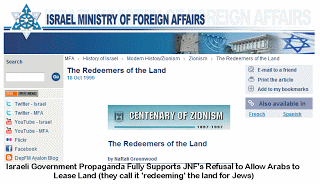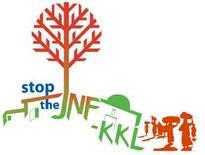The resignation of a board member of the JNF in the United States is significant. It is a demonstration that the JNF, which when I was a child, had an almost mythical status as the organisation which drained the swamps and planted forests in Israel, is no longer untouchable. Quite the contrary, the Charity Commission is under pressure to review its absurd charitable status since, as far as I am aware, promoting racism and apartheid is not a charitable activity.
Its blue boxes were in every Jewish house in which you would drop the odd coin (in our house very odd!). I can even remember going out one Sunday, when I was about 13, to deliver heavy packages from the JNF to members of the Jewish community. We were saving them the cost of postage! Little did we know that the JNF was a web of racist corruption, with Executive members getting multi-million dollar packages, about the evictions of non-Jews, the buying up at knock-down prices of the land of the refugees.
However neither I nor anyone else was told of the darker side of the JNF. That its tree planting and forestation was the warm, green side of a racist colonial organisation which refused to allow non-Jews to rent its land and which was a key player in Israeli Apartheid.
It is a tribute to the new found strength of the BDS movement that a senior official, interestingly a member of J-Street, the alternative somewhat more liberal alternative to AIPAC, has resigned over its ‘evic and Judaise’ policies.
Tony Greenstein
Some of my earliest Jewish memories involve dropping spare change in the Jewish National Fund’s iconic little blue boxes. I was proud that my money would help plant trees in Israel. The JNF, I knew, was making the desert bloom.
As an adult, I became a member of the organization’s Washington, D.C., board and moved from donating extra nickels to raising thousands of dollars for JNF.
Now, I regret to announce that this week I have resigned my board position and am severing all ties with the organization.
My commitment to building a safe and secure Israel has not changed. My admiration for much of JNF’s environmental work has not changed. What has changed is a sense of betrayal I have at learning that JNF is a force in preventing long-term peace.
This fall, a subsidiary of the Israeli branch of JNF launched eviction proceedings against the Sumarin family, who live in the Silwan neighborhood of East Jerusalem. Under Israel’s controversial “Absentee Property Law,” the state may reclaim homes whose owners were not present in 1967, when Israel took control of East Jerusalem. In the case of the Sumarin family, the children of the original owner, Musa Sumarin, were declared absentees after his death even though there were other family members living in the home at the time. In 1991, the Israeli government took the step of transferring the property to the JNF subsidiary.
I have learned that the action on the Sumarin home is not an isolated case. JNF has gained ownership of other Palestinian homes in East Jerusalem and, in many instances, then transferred these properties through its subsidiaries to Elad, a settler organization whose purpose is to “Judaize” East Jerusalem.
In my eyes, the expulsion of the Sumarin family is a violation of human rights. But it is also part of the systematic transfer of Palestinian property to ideological settlers who wish to put facts on the ground that hinder a lasting peace agreement.
A few days before the proposed eviction, Rabbis for Human Rights – North America, in partnership with its counterpart in Israel, asked American Jews to write to the CEO of JNF requesting that he stop the eviction. More than 1,300 people responded. I believe that, like me, these writers felt deeply betrayed that the organization many of us have supported since our childhood would act in such unjust ways.
JNF’s initial response was to deny any involvement in the eviction. When legal papers that name a subsidiary of JNF as the initiator of the proceedings became public, the organization decided to postpone the eviction.
I hope that JNF will decide to cancel this eviction for good, and to refrain from pursuing additional such evictions. But I felt I had to resign now because senior people at JNF made clear to me that they still plan to get the Sumarin family out and transfer the property to Elad.
I have always supported Israel through organizations like JNF because I believe that the Jewish people have the right to a secure, democratic and peaceful homeland in Israel. And I strongly believe that the Palestinian people have the right to a secure, democratic and peaceful homeland in a neighboring Palestinian state. By supporting right-wing settlers in “Judaizing” Palestinian neighborhoods, JNF makes this vision harder to achieve. I fear that such actions endanger Israel’s future as a secure and democratic state.
My commitment to Israel remains strong. But I will invest my time and financial resources in organizations committed to peace, democracy and coexistence between peoples.
Seth Morrison is Immediate Past Chair of the Friends of the Arava Institute and a member of the Washington D.C. Local Steering Committee for J Street.
This posting has 3 items on the appropriation of land and property to create the Jewish homeland:
1) report of eviction frozen;
2) report of planned property seizures (Samreen is the same family as Sumarin);
3) background paper on Jewish National Fund
Following the request submitted to the local court by Adv. Muhammad Dahleh, who represents the Sumarin Family, the court ordered to freeze the eviction procedures against the family.
The main request submitted by Dahleh was to cancel the previous ruling of the court, from 2005, which ordered the eviction of the Sumarin family without any response or defense by the family. Today, the court gave Himnuta, who is demanding the eviction, a chance to respond to the request until the 18th of December 2012. After that, the court will decide whether to cancel the eviction ruling or not. The court ordered that until the decision is made, the eviction procedures will be frozen.
It is yet another opportunity for the JNF to withdraw from evicting the Palestinian family from its home in East Jerusalem. The JNF can easily decide not to object the cancellation of the previous ruling and avoid another political crisis in East Jerusalem.
The court decision:
[…] 2. I hereby give order for the delay the eviction procedures until a decision is issued regarding the cancellation of the court order. 3. The respondent will present a reply to the request for cancellation until 18.12.2011.
Palestinian lawyer Ahmed Al-Ruwaidi said, according to confirmed information, that Jewish settler societies received recently the green light from the Israeli government to appropriate more Palestinian real estate from the natives in occupied Jerusalem.
Ruwaidi, one of the Jerusalemite natives, added that official parties in the Israeli government set a scheme to seize the Palestinian property and earmarked a budget for that.
He explained that the scheme will start during the coming days by seizing a property owned by Samreen [Sumarin] family in Silwan district, a few meters away south of the Aqsa Mosque, and the house of Zalloum family in Sa’diya neighborhood of the old city.
According to the information the lawyer has, the scheme will involve attempts to offer money to the Palestinian owners to make them leave their property or to use police force with the help of Jewish settlers to take hold of them during night raids if they refused to leave.
These houses are part of a network of Palestinian homes in the old city and Silwan district, which was exposed to many seizure attempts by the Israeli occupation authority (IOA) and Jewish settlers, and Israeli courts issued many verdicts on them during the past 20 years, but the IOA was waiting for certain political circumstances to take control of them and other property in Jerusalem, the lawyer clarified.
The scheme will target the old city of Jerusalem, and the areas of Silwan, Sheikh Jarrah, Wadi Joz and Ras Al-Amud and the IOA will use the custodian of absentee law to implement it, the lawyer noted.
He stressed that despite the cooperation of the Palestinian owners who filed legal petitions with Israeli courts and provided all authentic documents that confirm their ownership, but the Israeli judiciary proved itself as part of this scheme as it did earlier when it allowed Jewish settlers having forged real estate papers to seize dozens of Palestinian homes in Silwan, Sheikh Jarrah and the old city.
Background Paper:
,Thursday, 10 June, 2010 London, UK
The Jewish National Fund (JNF) or Keren Kayemet LeYisrael was founded in 1901 in Basel by the World Zionist Organisation, with the aim of purchasing lands in Eretz Yisrael, the biblical name for Israel/Palestine. In its letter of association, JNF stipulated that it would buy lands for Jews only.
Ninety-three percent of the land in Israel is “State Land”, that is, lands owned by the Israeli government, by the Israeli government’s Development Authority or by the JNF. Of these, 17 percent are owned by the JNF. [in fact 13% – TG]
In 1961 the JNF and the State signed an agreement for joint administration of their lands by the Israel Land Authority (ILA), whose Directorate of 13 includes six JNF representatives. The JNF was given special status in Israeli law, and is viewed as the decisive entity in land policy in Israel. ILA-administered lands were to be leased for long periods but never sold.
In order to preserve the JNF principle of allocation to Jews only, the agreement stipulated that when a non-Jew leased a plot from JNF, the ILA would give the JNF a plot of equal size from state lands in return.
In 2004 the ILA stopped the land exchange arrangement with the JNF, leading to a refusal to lease lands to Arab citizens of the state, who make up 20% of Israel’s population. Arabs who attempted to lease JNF lands or to register apartments and properties they had bought were prevented from doing so.
Three High Court petitions were submitted by rights groups Adalah, Mossawa, the Association for Civil Rights in Israel (ACRI) and the Arab Centre for Alternative Planning against this practice, leading to a resolution for some individuals, but no principled ruling regarding discrimination in land allocation on ethno-nationalist grounds.
In 2007 a law was tabled by the Israeli Knesset according to which JNF lands should officially be sold to Jews only. The bill needs to be voted on twice more in the Knesset before passing into law.
In 2009, the Israeli Knesset passed a historic new ILA land reform law. The new law institutes broad land privatization; permits land exchange between the state and the JNF; allows lands to be allocated in accordance with “admissions committee” mechanisms and to candidates approved by Zionist institutions working solely on behalf of the Jewish people; and grants decisive weight to JNF representatives in a new Land Authority Council, which will replace the ILA.
According to rights group Adalah, the new law is prejudicial to the constitutional rights of Palestinian Arab citizens of Israel, and violates the property rights of Palestinian refugees as it contravenes international humanitarian law (IHL) applicable to them and their property.
The law joins a series of other legislative initiatives in which discriminatory segregation is increasingly sanctioned by the Israeli Knesset.
For example, also in 2009, another law was tabled according to which prospective buyers of land in new communities in the Negev and Galilee will be requested to pass an admissions committee, in which Zionist values can be a legitimate criterion for admission and land purchase, along with other criteria such as “social suitability.” Several communities in the Galilee (e.g. Manof, Yuvalim) already use such criteria in order to exclude Arabs and other minorities.
The JNF is a significant player in the illegal settlement of the occupied West Bank and East Jerusalem.
According to its official policy, the JNF does not purchase lands beyond the Green Line, one reason reportedly being to keep it out of political debates liable to have a negative effect on donations.
However, according to a 2005 investigation by Israeli newspaper Haaretz, in 1938 the JNF set up a subsidiary company called Himanuta, whose role was to conduct property purchase and sale in sensitive cases where the JNF did not want its name to be cited.
The JNF holds 99 percent of the company’s shares, and its official offices are at the JNF. Legally, Himanuta is an independent company; in practice, it is the JNF by another name.
During the British Mandate in Palestine (1917-1947) Himanuta purchased lands in the Jericho area and in the territory now housing the West Bank settlement of Ma’aleh-Adumim to the east of Jerusalem, reportedly aiming to form a Jewish continuum between Jerusalem and the Jordan Valley.
Since the 1967 Six-Day War, JNF subsidiary Himanuta, which is registered as a company under both Israeli and Jordanian law, has purchased tens of thousands of dunams (square kilometres) of land in the West Bank, including in settlements around Jerusalem and the Etzion settlement bloc.
The lands purchased by Himanuta are all near the Green Line, in areas which would be up for negotiation in the event of an Israel withdrawal to the 1949-1967 armistice lines. According to Haaretz, they were purchased with funds from the Israeli government and the World Zionist Organization (WZO).
In occupied East Jerusalem, the JNF itself has bought and developed extensive lands. In accordance with its principles of purchase and lease of lands to Jews, it has planted forests on these lands and later leased them to Jews for settlements. For example, the settlement Har Homa (1997) is built on a former JNF forest, and a 1,000-dunam forest was planted by JNF in 1982 between what are now the Jewish settlements of Neve-Yaacov and Pisgat-Ze’ev.
For further information on JNF policies see:
Keren Kayemet LeYisrael (JNF) ;
JNF, treasury seek formula for continued Jews-only land sales
JNF ‘Redeemers of Land’
JNF and Supreme Court [Hebrew]


